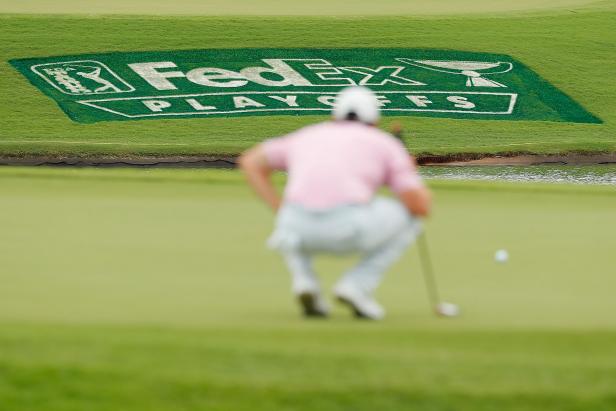In a PGA Tour season where terms like “things are fluid” and the “new normal” have become part of the lexicon thanks to COVID-19, there’s something ironic about the fact that the upcoming FedEx Cup Playoffs incorporate almost no changes for 2020. What makes that so is that since their inception in 2007, the Playoffs have been, well, fluid.
During the first few years, PGA Tour brass tinkered with how many points golfers received for regular-season events versus playoff events. For 2009, they made sure players couldn’t clinch the FedEx Cup before the end of the Tour Championship (as Vijay Singh had done in 2008). In 2015, points reset when golfers got to the Tour Championship, ensuring that every player in the final field had a mathematical chance to win the FedEx Cup.
In 2019, however, the playoffs took on their biggest and most radical alternations. The number of events were reduced from four to three and the Tour Championship format changed so that the winner of the tournament at East Lake Country Club was also automatically the FedEx Cup champion.
For a refresher in how the playoffs work, here are some answers to some questions that will help you understand what’s in store as the tour crowns its next FedEx Cup champion.
When are the FedEx Cup Playoffs played?
Here is the three tournament schedule:
The Northern Trust, TPC Boston, Aug. 20-23, Winner: Dustin Johnson
BMW Championship, Olympia Fields, Aug. 27-30, Winner: Jon Rahm
Tour Championship, East Lake G.C., Sept. 4-7
How many golfers will play in each of the three events?
The top 125 players off the FedEx Cup points list are in the field at The Northern Trust. That number decreases to 70 for the BMW Championship. The top 30 will then advance from Olympia Fields to Atlanta for the Tour Championship, the traditional conclusion of the season.
OK, you mentioned the big change last year in the format for the Tour Championship. Remind us again: How is the actual FedEx Cup winner is decided?
OK, so instead of all 30 players starting with the same score when they compete at the Tour Championship, players are now staggered by strokes based on where they stand in the FedEx Cup points list coming into East Lake. The No. 1 ranked player, Dustin Johnson, begins the final tournament at 10 under par, with the No. 2 player, Jon Rahm, at eight under, and then seven under, six under and five under for Nos. 3-5. Nos. 6-10 start at four under; Nos. 11-15 start at three under; Nos. 16-20 start at two under; Nos. 21-25 start at one under; and Nos. 26-30 start at even par. The individual with the best score after the stroke adjustment—not merely the best 72-hole score—will be the winner of the Tour Championship and the FedEx Cup.
Here’s then is how things stand as we arrive then at East Lake:
Dustin Johnson, -10
Jon Rahm, -8
Justin Thomas, -7
Webb Simpson, -6
Collin Morikawa, -5
Daniel Berger, -4
Harris English, -4
Bryson DeChambeau, -4
Sungjae Im, -4
Hideki Matsuyama, -4
Brendon Todd, -3
Rory McIlroy, -3
Patrick Reed, -3
Xander Schauffele, -3
Sebastián Muñoz, -3
Lanto Griffin, -2
Scottie Scheffler, -2
Joaquin Niemann, -2
Tyrrell Hatton, -2
Tony Finau, -2
Kevin Kisner, -1
Abraham Ancer, -1
Ryan Palmer, -1
Kevin Na, -1
Marc Leishman, -1
Cameron Smith, Even
Viktor Hovland, Even
Mackenzie Hughes, Even
Cameron Champ, Even
Billy Horschel, Even
So there are no separate winners of the Tour Championship and the FedEx Cup anymore?
Nope … that’s why the change was made, to help eliminate the confusion of somebody winning the tournament at East Lake but not being the actual FedEx Cup champion. In fact, there is no longer a separate purse for the Tour Championship.
Were there two winners a lot?
In the first 12 years of the Playoffs, it happened four times, including 2017 and 2018. Remember Tiger Woods’ win at Tour Championship two years ago? Well, it was Justin Rose who took home the FedEx Cup. Given how frequently this was happening, tour officials decided they needed an alternative to simplify the race for the FedEx Cup title.
Does winning the Tour Championship count for a player’s victory total?
Yes. It still counts for the PGA Tour’s records.
Who were the players in the lead at the start of this year’s playoffs?
After the Wyndham Championship, the finale of the 2019-’20 regular season, Justin Thomas was the FedEx Cup points leader with 2,458 points. He holds a 556-point edge on second-place Collin Morikawa (1,902 points). Webb Simpson (1,878), Bryson DeChambeau (1,657) and Sungjae Im (1,633) complete the top five. Interestingly, Dustin Johnson started the playoffs 15th on the points standings and Jon Rahm started at 10th.
Do points from the regular season carry over into the playoffs?
Yes. And then any points earned in the first two FedEx Cup playoff events are added to a player’s regular-season points to get their new place on the FedEx Cup points list each week.
How are the points earned different in the playoffs compared to the regular season?
As you might imagine, a premium is given to players who win/play well playoff events. If you won a regular-season PGA Tour stop, you earned 500 points. For a playoff win, you get 1,500 points. Similarly, all players earn three times the points for their performances in playoff events compared to regular-season tournaments. (Note: This was the one real change in the playoffs structure from 2019, playoff event points were worth four times as much as a regular-season event. PGA Tour officials reduced the playoff event points due to the shortened regular-season schedule caused by missing 11 tournaments due to the coronavirus.)
Who is the defending FedEx Cup champion?
Rory McIlroy won in 2019, jumping up from the fourth spot at the start of the Playoffs. McIlroy had an 18 under total in the Tour Championship (13 under for the four rounds, plus five under entering the tournament for his position on the points list), four better than Xander Schauffele and five better than Brooks Koepka and Justin Thomas. Heading into this year’s Tour Championship, McIlroy is No. 12 in the standings.
Who has won the most FedEx Cups?
With his win last year, McIlroy now has won the Playoffs twice, having also claimed the title in 2016. Only one other golfer—Tiger Woods, perhaps you’ve heard of him—has won the Playoffs twice, in 2007 and 2009.
Other past champions include:
2008: Vijay Singh
2010: Jim Furyk
2011: Bill Haas
2012: Brandt Snedeker
2013: Henrik Stenson
2014: Billy Horschel
2015: Jordan Spieth
2016: Rory McIlroy
2017: Justin Thomas
2018: Justin Rose
Will Tiger Woods be in this year’s FedEx Cup Playoffs?
He was actually, through the first two playoff events, but then failed to qualify for the Tour Championship. Woods played only five events in the 2019-’20 regular season, and just two after the tour’s restart in June, but with his Zozo Championship win last fall, he qualified for the playoffs at No. 47 on the points list heading into The Northern Trust. He made the cut at TPC Boston, but finished T-58, falling to No. 57 in points. That was enough to advance to last week’s BMW Championship, but he had to have a top-four finish at Olympia Fields to move into the top 30 and get to East Lake. Instead, Tiger finished T-51, bringing an end to his 2019-’20 PGA Tour season.
How much FedEx Cup prize money will be handed out?
The short answer: A lot. Starting in 2019 the FedEx Cup winner earned $15 million from an overall prize money payout of $60 million.
Here’s the breakdown for all the players at the Tour Championship:
1: $15,000,000
2: $5,000,000
3: $4,000,000
4: $3,000,000
5: $2,500,000
6: $1,900,000
7: $1,300,000
8: $1,100,000
9: $950,000
10: $830,000
11: $750,000
12: $705,000
13: $660,000
14: $620,000
15: $595,000
16: $570,000
17: $550,000
18: $535,000
19: $520,000
20: $505,000
21: $490,000
22: $478,000
23: $466,000
24: $456,000
25: $445,000
26: $435,000
27: $425,000
28: $415,000
29: $405,000
30: $395,000


